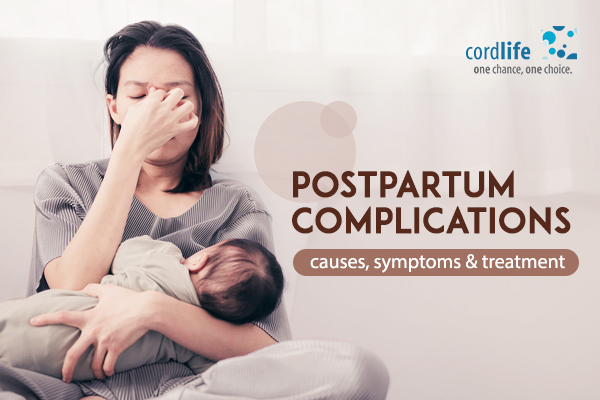At the end of your pregnancy journey, when you hold your little one in your arms, you feel like you’ve received the most precious gift of your life. With the baby in your arms, you might feel like you’ve ended your pregnancy complications, but that’s not the end. As a new mom, you should also be aware of your postpartum complications after your delivery.
So, continue reading to understand the causes, symptoms & treatment methods of postpartum complications.
What Are The Common Postpartum Complications?
The period after the delivery of your baby is known as puerperium. This period begins right after the delivery of your baby and continues for about 6 to 8 weeks. In fact, it is perfectly normal for you to feel the after-delivery discomforts. So, the most common postpartum problems are:
Postpartum Bleeding
This postpartum symptom usually occurs within 1 day of your childbirth and is also known as Postpartum haemorrhage. This is serious but a rare condition in you, whether you have given birth vaginally or via an Emergency C – Section. 1 to 5 new moms out of 100 undergo this postpartum bleeding symptom. Once you deliver your baby, the uterus contracts and pushes the placenta out. Due to the contractions, there is pressure on the blood vessels, where the placenta – an extremely essential organ for foetal development was attached. However, if somehow, the contractions are strong, the bleeding is more. In fact, the risk of excessive bleeding after delivery is due to placental abruption, placenta previa, prolonged labour, infection, etc.
Ways To Treat Postpartum Bleeding
Since the aim to treat this particular postpartum complications after childbirth is to stop the bleeding, the treatment method may include taking medicines, uterine massage, surgically removing the remains of the placenta from the uterus and using a kind of balloon to reduce the bleeding.
Postpartum Infection
When a certain type of bacteria infects the uterus and the area surrounding it after you’ve delivered your baby, you might get postpartum infections. In fact, some of the postpartum infections are endometritis (infection of the uterine lining), myometritis (uterine muscle infection), and parametritis (infection around the uterus).
Ways To Treat a Postpartum Infection
Since some of the unhygienic conditions may give rise to infections after you’ve delivered your baby therefore your doctor might suggest you take antibiotics before your delivery. Consult the doctor if the infection leaves you with symptoms such as fever, lower abdomen pain, paleness of the skin, headache, loss of appetite and so on.
Postpartum Incontinence
It is an involuntary leakage of urine that can occur after pregnancy and childbirth.
Ways To Treat Postpartum Incontinence
Simple ways like doing at-home physical exercise like kegels can treat this post-pregnancy complication. Besides doing some exercise, bringing a little bit of change in your diet can also help the situation.
Breast Pain
Breastfeeding is absolutely your personal choice. However, whether or not you choose to breastfeed, breast pain is a common after-pregnancy breastfeeding complication. Sometimes you might even start to feel cracks and blood, as a result of improper latching of your baby.
Ways To Treat Breast Pain
Consult the doctor not just to know the breastfeeding techniques, but also consider his or her advise on how to treat your breast pain. You can also try out the following ways to get relief from your breast pain by using hot or cold compresses, taking warm baths, and taking pain-relief medicines as prescribed by the doctor.
Stretch Marks
Stretch marks appear, when your skin is stretched due to the progression of your pregnancy and after the delivery of your baby, the skin is trying to go back to normalcy. In fact, these lines appear on the thighs, belly, hips, and breasts.
Ways To Treat Stretch Marks
You can either use essential oils with coconut oils to treat stretch marks or apply moisturising creams and lotions. You can also consult your healthcare practitioner to purchase a few prescribed lotions to reduce your stretch marks.
Baby Blues or Postpartum Depression
Besides the physical discomforts after the delivery of your baby, you might feel moody, morose, anxious, and hopeless. Sometimes you might even feel detached from your little one. At least 1 out of 10 new moms suffers from postpartum depression.
Ways To Treat Postpartum Depression
Since you’re a new mom with a newborn there will be visitors to your house more often. Moreover, since you’re going to feel a little depressed, and the newborn would be a little vulnerable health-wise at this stage, you may not allow many visitors to your house. This aside you can include yoga, and meditation, and have proper postpartum nutrition which can reduce your stress levels after childbirth.
Postpartum Psychosis
This is different from that of postpartum depression. In postpartum psychosis condition you might have bipolar disorder, schizophrenia and several mental problems right after a few days of your baby’s birth.
The reasons for such mental ill-health are not really proven, however, some clarifications are present. They include post-pregnancy hormonal fluctuations, history of bipolar disorder in family Environmental factors, feeling sleep-deprived and so on.
Ways To Treat Postpartum Psychosis
There is a combination of treatment methods and therapies. They include:
- Hospitalization till such time that your symptoms are reduced.
- Taking antidepressants as suggested by your doctor.
- Getting electroconvulsive therapy to give you a sense of relief.
- Well! You can also manage your stress levels with the help of a support group.
Since the period after your baby’s delivery is very crucial, you need to be aware of all signs of postpartum complications to handle them with care. Remember, just like taking care during your pregnancy days, postpartum care is also important to bring back your pre-pregnancy flexibility and strength.
Follow our blog page to get some more information on pregnancy, postpartum, and benefits cord blood banking.
